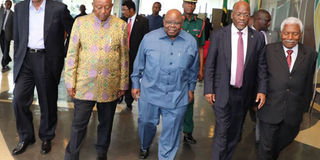CCM has relied on individuals, that is the problem

Tanzania's President John Magufuli (second-right) met his predecessors Ali Hassan Mwinyi (right) and Benjamin Mkapa (centre) as well as other former top government officials on July 3, 2018. It was the very first time that such a consultation was held since Magufuli assumed the presidency in 2015. PHOTO | File
What you need to know:
For many years, CCM has failed to utilise its vast, unrivaled political network countrywide to the point of relying on individual members every time they have a crisis be it political or financial.
President John Magufuli invited retired leaders to Magogoni for their counsel and with a good sense of humor added that he had missed them as well. Given the nature of politics in the Great Lakes region, it is near impossible to see the same sight replicated in other countries. Some of the countries in the region do not have living former presidents. Some have living former presidents, vice presidents and prime ministers but these fell out with those in power long ago and have turned into political enemies.
Even in some of the countries where power has not been lost to an opposition party, like Zimbabwe and South Africa, there is so much bad blood between the current presidents and their predecessors who are seen as political liabilities as such a meeting between former and present leaders will be seen primarily through the prisms of mending their ties rather than those in power listening to the wisdom of the past to get them through in the present.
The invitation of former leaders who have since decamped to the opposition was important for the stability of this country and showing ordinary people that even though their leaders have very different visions for the present and the future of this country they can still sit together and talk. In some countries in the region, leaders — former or present — cannot even meet during social events like weddings or funerals.
The inclusion of former non-political leaders like retired judges added a unique dimension to the meeting because it made it not a complete political affair.
Of those invited, former president Benjamin Mkapa, a man known for shooting straight arrows said that he wanted to see ministers identify themselves as serving in a CCM government something he thought they were not doing enough. He said that all the ministers and the president were members of CCM which forms the government.
Mkapa’s point was like a lesson in humility given to former Popes and Roman rulers about the fleeting nature of glory. Liberation movements/long ruling parties in this part of Africa are careful about preventing the rise of a personality cult as that undermines the underlying philosophy through which they have survived so long in power; that of the supremacy of the party over the individual.
It is this philosophy which has made it possible for South Africa’s governing party, the ANC to topple two presidents and Zanu-PF to topple a longtime ruler. CCM too once deposed a former Zanzibar president. It is always about the party.
In a few cases where the individual is distinguished from the party, as is the case of former South African president, Nelson Mandela, there is a constant reminder, that the individual is merely part of a larger organization and viewing the individual separately from their organization is misleading and ignoring the fact that such individuals are products of their parties.
However, CCM has a huge problem.
From the first multiparty general election in 1995, when it comes to winning elections it has relied more on individuals than its record in power. It has summoned the magic of individuals within the party who have shined more than their party for different reasons. Every time the powers within CCM feel like its political brand is tainted, it brings forward individuals who will make it easier for voters to separate the individual and the party, or put more faith in the power of the individual to influence the party.
It was Mwalimu in 1995 who came to the rescue. It was Jakaya Kikwete in 2005. And it was Magufuli in 2015 where even the election campaign posters stressed on the personal integrity of the candidate than the party which he was representing as their flag bearer. All these individuals reminded voters countless times that all they promised could only be done through their party, CCM. However, voters found ways to separate them, the promises and their party.
This came with a political cost. They won elections but the price to the party’s identity was high.
For many years, CCM has failed to utilise its vast, unrivaled political network countrywide to the point of relying on individual members every time they have a crisis be it political or financial. A party that has its roots in serving workers and farmers; the backbone of the country’s economy with a significant number of the poorest people ended up forgetting their potential in saving their party from danger every time it came calling.
CCM has relied on individuals for far too long that it will take more than words from a former president and party chairman to return things on the original path. But is this a case of closing the stable door after the horse has bolted?
Mr Mwakibete is a socio-political commentator and analyst based in Dar es Salaam




